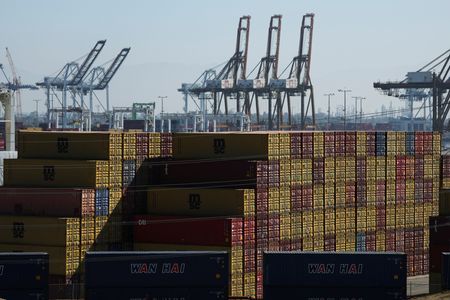(This Feb. 10 story has been corrected to change the name of the trade body after it re-branded in January, in paragraph 7)
By Corina Pons
PENAFIEL, Spain (Reuters) – A top Spanish winemaker is hedging against anticipated tariffs by U.S. President Donald Trump on European Union products by sending extra stock to the United States that would allow them to stagger any price increases.
Luisa de Paz, export manager for the Protos winery in the Ribera del Duero region, said the company has sent enough stock to the U.S. to cover up to six months should the U.S. apply a tariff to EU wine exports that the sector has been advised could be as much as 10%.
“We began preparing ourselves at the end of the year after he was elected,” De Paz said in reference to Trump. “We expedited orders so that they would have enough for the first six months. They have a security stock.”
Data shows Protos’ competitors are also moving to protect themselves from potential tariffs while U.S. companies are expediting imports of everything from auto parts to Italian parmesan cheese and French cognac to prepare for the possibility of new tariffs as Trump threatens to lead previous global allies into a full-blown trade war.
Wine exports from Spain to the U.S. rose by 20% in December, an increase the Spanish Wine Federation attributes in part to stockpiling by importers ahead of possible tariffs.
Sending additional stock would allow importers to stagger price increases in the coming months should tariffs be introduced, De Paz said.
The U.S. is the second-largest export market for Spanish wines after Germany, according to the Spanish Wine Interprofessional Organisation. Protos exports around 250,000 bottles a year to the U.S., its second biggest export market after Mexico.
In 2019, during Trump’s first term, the U.S. imposed tariffs of 25% on certain wines and other spirits from four European countries, though they did not directly impact Spain.
Spain could lose out to competitors such as Argentina, which might in any potential trade war benefit from President Javier Milei’s close relationship with Trump, said Miguel Sanz, director of the certifying authority for the Ribera del Duero region’s wines.
(Reporting by Corina Pons, Guillermo Martinez and Violeta Santos; editing by Charlie Devereux)









